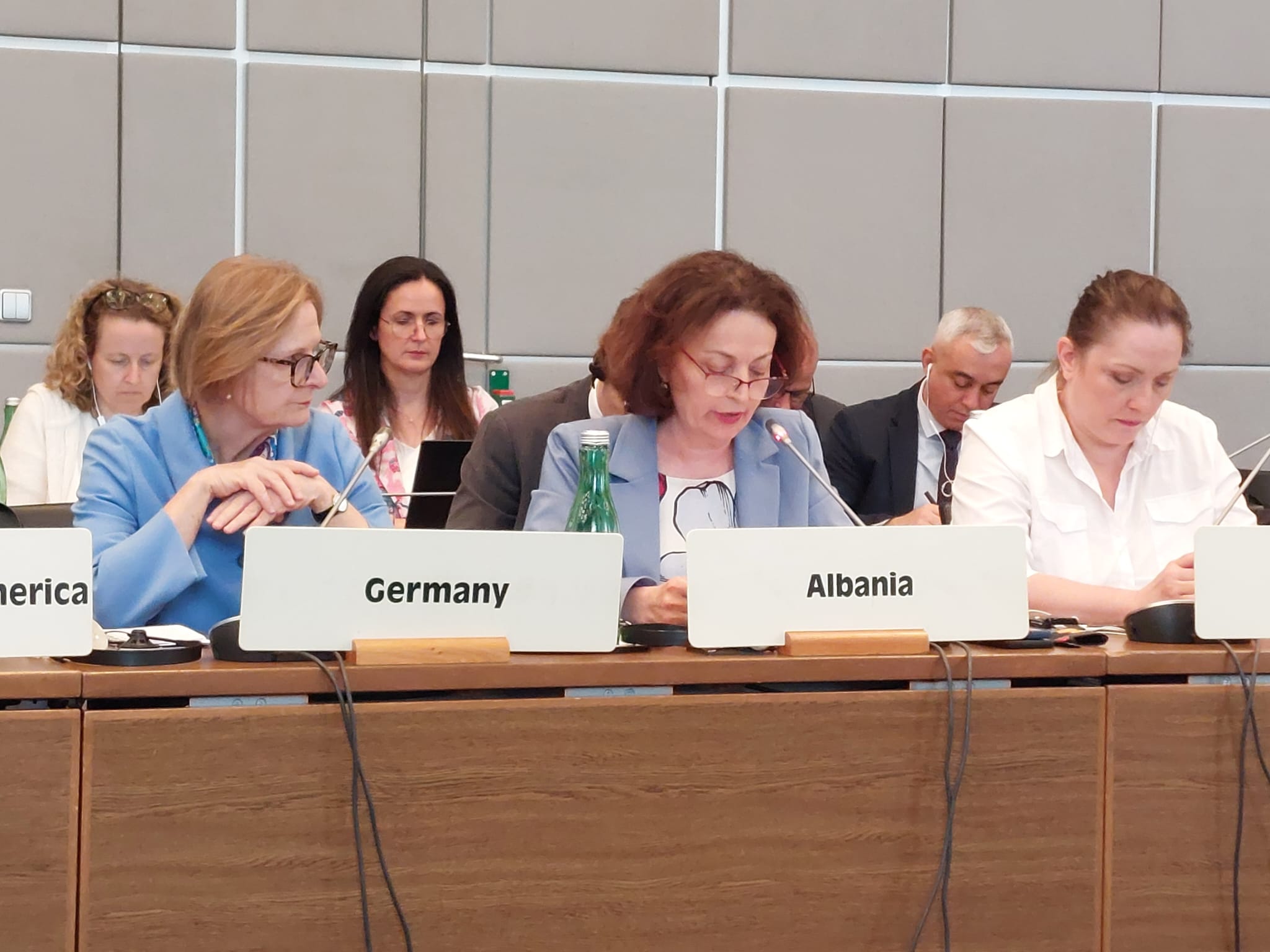Statement delivered by the Permanent Representative of Albania, Ambassador Eglantina Gjermeni,
OSCE Forum for Security Co-operation, Wednesday, 18th of June 2025, Vienna
Thank you, Madame Chairperson,
Let me begin by expressing Albania’s sincere appreciation to the Estonian Chairpersonship of the Forum for Security Cooperation for dedicating today’s Security Dialogue to the topic of Women, Peace, and Security (WPS). We commend your continued commitment to ensuring this vital issue remains at the forefront of our collective agenda.
I also wish to join previous speakers in extending our gratitude to the panelists for their insightful contributions, and for addressing the important questions raised during this session.
It is an undeniable truth that women’s contributions are essential to the advancement of sustainable development, democracy, and peace. The Women, Peace, and Security agenda is not only central to global peacebuilding efforts—it also remains a critical framework for addressing the gender-specific impacts of conflict to women and men, and fostering lasting and sustainable peace.
Through their diplomacy and innate ability to bridge divides, women consistently demonstrate a unique power to unite cultures and societies. They create connections where there are differences, infuse public life with progressive values, and contribute to the transformation of institutions and interstate relations.
Although women are often disproportionately affected by conflict—facing violence, displacement, and insecurity—they are also agents of strength and resilience. Across the globe, in conflict areas, women lead humanitarian efforts, support their families and communities, and drive peacebuilding efforts at the grassroots and institutional levels.
Despite notable progress on paper at the global level, the gap between commitments and their implementation remains substantial. Even after 25 years of adoption of UN Resolution 1325, women continue to be under represented in peace processes and decision-making structures, while instances of sexual and gender-based violence in conflict situations, often remain unaddressed and unpunished. The brutal consequences of war, most recently highlighted by Russia’s aggression against Ukraine, remind us of the urgent need for accountability, and the importance of full implementation of the WPS framework.
Madame Chair,
Earlier this month, on the 2nd and 3rd of June, the third edition of the International Forum on Women, Peace, and Security—an initiative led by Her Excellency Vjosa Osmani-Sadriu, President of the Republic of Kosova—was held in Prishtina. This year’s Forum brought together over 1,000 participants from more than 45 countries, and focused on one of the most pressing issues of our time: the protection of women in conflict. As President Osmani so powerfully stated: Quote – “There is no nobler mission than to ensure that today’s children never experience what we have gone through.” This Forum exists precisely to amplify the voices that war tried to silence, to empower those who refused to be broken, and to build a safer, more inclusive future for all.
At that same event, the Speaker of the Albanian Parliament, Her Excellency Elisa Spiropali emphasized the need to continue championing the remarkable role of women in our region—a region where development, cooperation, democracy, and peace remain fragile. She stated that that Quote -“In our region, we know all too well the devastating price of conflict—and, equally, the immense power of reconciliation. Yet we must confront a painful reality – it is women and children who consistently bear the heaviest burdens of war. Still, we have seen that when women are given the opportunity—and, crucially, when they are empowered—they become drivers of transformation, architects of peace, and the moral conscience of our societies”.
Madame Chair,
Albania remains fully committed to advancing the Women, Peace, and Security agenda. We demonstrated this during our OSCE Chairmanship in 2020, and further consolidated our commitment during our tenure on the United Nations Security Council (2022–2023), where we consistently highlighted that women should not be sidelines in conflict areas, we brought to attention gender-based violence in war and conflict situations, as well as advocated for strengthening women’s roles as peacebuilders.
Our dedication is reflected in the adoption of Albania’s Second National Action Plan on WPS (2023–2027), developed in close cooperation with civil society, academia, and international partners. This strategic document sets out clear priorities:
Increasing women’s participation at all levels of decision-making;
Strengthening support for survivors of gender-based violence, including cyber-violence and femicide;
Promoting peace education and leadership opportunities for young women; and
Investing in the economic empowerment of women and girls.
Albania has translated aspirations into action, through tangible policy reforms aimed at fostering gender equality and women’s empowerment. Today, our country ranks among the leaders in the region in key indicators of gender parity—especially within political and governmental institutions. We are aware that there are still many challenges that Albanian women face, and are committed, and working to address them.
In closing, let me reaffirm Albania’s unwavering commitment to building an inclusive, peaceful, and just society—one in which gender equality and women’s empowerment are not merely aspirations, but solemn responsibilities we owe to present and future generations.
Thank you






